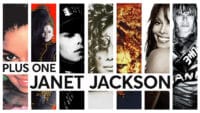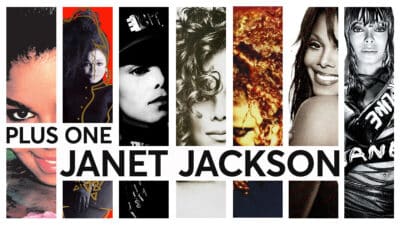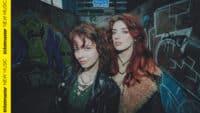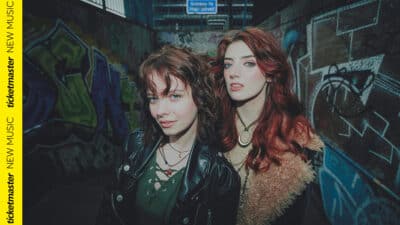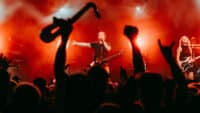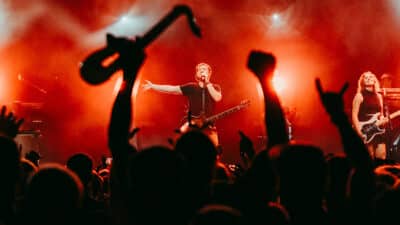Interview
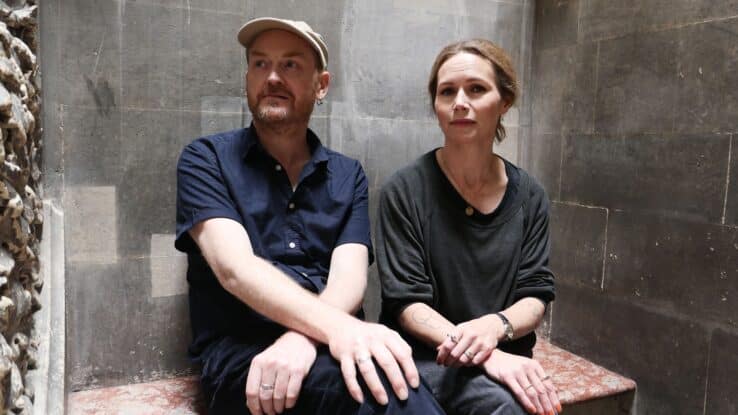
Interview
Stage Times: James Yorkston & Nina Persson
The newfound friends and collaborators look back at their best, biggest and weirdest performing highlights
On the face of it, James Yorkston and Nina Persson might be considered unlikely collaborators. In the early noughties Yorkston was a key member of Fife’s Fence Collective alongside King Creosote and K.T Tunstall, before support slots with John Martyn and Bert Jansch kickstarted a two decade folk career and longstanding relationship with Domino Records. He had heard of Persson only as a fan, like many, of her wildly successful album in 1995 with The Cardigans, Life.
But after Yorkston worked with another group of Swedes, The Secondhand Orchestra, on his 2021 album The Wide, Wide River, the group’s bandleader Karl Johan Qinqvist had an idea. ‘KJ’ is a savvy character in the Swedish music industry, Yorkston says. “He’s one of these guys with fingers in many pies”, from record labels to radio shows, and suggested The Cardigans singer come down for a session.
The result was 2023’s The Great White Sea Eagle, another collection of gently swelling folk songs. One song turned into one album, which has turned into a touring unit in demand. “We counted it recently,” Persson says, “We’ve done 50 plus shows together”.
As the duo arrive in the UK for a small string of dates, they look back at the highs and lows of their respective gigging careers.
The gig that made you want to play music
James Yorkston: I used to go and see hundreds of bands when I first moved to Edinburgh. All these hardcore punk bands like Doom and Napalm Death and Victim’s Family and Dog Faced Hermans, you know, it was just something that was always there. There was always just going to be a slide onto the stage, but I think the first gig I went to, where there was the all encompassing romance that you can get from live music, was Cocteau Twins, at the Glasgow Barrowlands. I think I was 16 or 17 at the time and seeing them showed me that there could be a lot more than just loud and blaring punk rock. Also, I have to say that because my voice is so similar to this Liz Fraser, of course…
Nina Persson: [Laughs] This one is the hard one because I had been to a couple of gigs before I joined the band, but not many. They were not experiences where I actually felt like I wanted to do that. I didn’t know I wanted to do it until, you know, it was suddenly, like five years into my career or something. I was completely green both at seeing and doing shows when I suddenly was on stage myself. So I think I would say, for me, it was actually watching artists perform on TV more. This was before MTV, when artists were singing on different talk shows or something, I remember I was sort of fascinated by that, you know?
Yeah, I had heard that you were hesitant to join The Cardigans at first and that for you it was more a way to hang out with friends?
NP: No, I didn’t hesitate, but it was for sure the social side that I joined. I just thought that I wanted to be with the fun and the cool people, and they happened to be the ones who made music. So I was like, OK I’ll sing if I get to be in the room.
The first
NP: I don’t really remember our very first shows as The Cardigans, but I remember early on we played three shows in a day. One was at a home for people with Downs Sydrome, because I think one of the band members worked there, that was lovely. And another was on a car trailer in a square in Huskvarna, a nearby town. I can’t remember the third, but all of this was before we were even playing in clubs.
JY: My first solo show was with Bert Jansch. That was an extraordinary thing. I’d been listening to a guy called the Garia, a Madagascan guitar player, and I decided to switch from electric bass to acoustic guitar. And somehow I got offered this show supporting Bert Jansch. I’d only been playing maybe maybe eight months or something, and I’m not a natural musician like that. But yeah, he was amazing. In fact, I’m doing a Bert Jansch tribute show later this year in London in the Royal Festival Hall with Robert Plant and a few other people who I can’t remember.
Bert was very kind to me, I didn’t have a very good guitar, but he just told to try and relax and have fun with the evening. There’ll be a really nice crowd and all that sort of stuff. The last time I played with him was in Paris, and he got booked into a nice hotel and I got booked into a not so nice one. And I couldn’t find it. So he actually came out with me. And we clumped around the streets of Paris looking for my hotel, at one in the morning. He was a super elegant guy.
Soon after that you were playing with John Martyn too…
That was a few years after that. I did the one show with Bert and then I retreated back into loud and blaring punk rock. I went back into the band I was in because I felt my fingers had been burned slightly, just because I was so nervous. And it’s a lot easier hiding behind things. But then when I got into the John Martyn tour, I just had to do it, you know? I had to do the solo stuff. I think that was 29 dates around UK and Ireland. By the end of it I felt pretty bulletproof. I kind of knew slightly what I could and what I couldn’t do.
You could do a lot worse to kick off your folk career than playing with Bert Jansch and John Martyn…
JY: Two amazing names to have on my CV, yeah! I learnt a lot from both of them. But our first gig together was actually awful. There was a really bad sound system, there was eight of us on stage and the equipment was playing up so the soundcheck went on for about three hours. By the time we went on stage, I think we just kind of thought, well, if we can’t fix the sound, there’s nothing we can do about it. So we just did our best with what we had. It sounded like one of those old metal dustbins full of rocks getting pushed down the hill.
NP: The first one with just us two was in Malmo, at a record shop. There happened to be a Steinway [piano] in the room, and I think we realised that even if we were quite fresh and green performing the songs as a duo, we can sort of compensate by being very present.
JY: Yeah, I remember it being a real relief. It was just like, well, I don’t want to say we’re not missing the band, because of course we’re missing the band, but it’s a different thing. It’s not better or worse. It’s just different; the soundtrack was certainly shorter.
NP: We knew that we had about 15 dates booked in that format, so it was relief also knowing that all right, good, it’s gonna work.
The biggest
NP: The Cardigans’ shows definitely got a lot bigger after Life, for sure. We played the Budokkan Arena in Tokyo, which is big in size but also historically, there are so many albums called ‘Live in Budokkan’. It was very big for us to play two nights there.
You mentioned earlier how green you were to performing, did it take much time to adapt to the stage as The Cardigans became more successful?
NP: Oh it really took a long time for me to adapt. I kept struggling with nerves and the routine and, you know, simple things like microphone techniques and knowing how to sound check and everything. It’s a lot to learn. But we were lucky in that pretty early on we ended up at a very comfortable level, so to speak. So we would have crews early on, sound engineers and that kind of thing, which was helpful. So I didn’t really have to completely struggle. I never thought of The Cardigans as a loud band but we are loud on stage, so I realise now how much more I have to sort of struggle and exert myself when I play with them, as opposed to with James.
JY: The biggest show I’ve ever done was actually a support slot, performing with David Grey. We did three shows with him at The Point in Dublin. Yeah… I don’t miss those days. It was part of a nine-date tour, and there’s 36,000 people, in theory, coming to see us. So I thought, well, we might sell a little bit of merchandise, even if David’s merch people had pushed the price of our merch up so it was pretty expensive. But when I went to swap out the stock at the end of the third show, I was a little disappointed to find that we’d only sold one T-shirt out of absolutely everything…
But it was it was good fun, we had our own little room overlooking the stadium with a glass door. So if you turn one way you could watch the telly and there’s all this free beer, but then if you went through the glass door suddenly you’re in the arena. It was good fun and I appreciated doing it as it saved me from doing a 30-day tour I had booked around Europe and I needed to get off that basically, because my sanity was going. So David Gray got me home three weeks earlier than I would have otherwise. Which is what music’s all about… getting home.
The weirdest
NP: We had a really weird show in Russia, I don’t remember where it was but the heir of Russia’s biggest medical company had his 35th birthday party. To celebrate he invited us, Status Quo, Madness and Duran Duran to this old arena. That was his birthday party for himself. It was so gross knowing it was this young, rich private dude pooping money like that. I used to be a Duran Duran fan as a kid but I was grossed out at how they seemed to hate the experience – they were making faces at each other like it was their worst time ever. I decided if my band ever acts like that we need to stop.
Everything about the show was odd. You know, we haven’t done a lot of private or corporate shows. But this was one we said yes to – we got paid an insane amount for it. And then at the end, for 30 minutes, there were nonstop fireworks. You know, burning a couple of extra million there. I was really curious who the kid was. In my mind I had just painted a pretty bleak picture of him. And then somebody came and said he would like to say hi. And we were like, okay, of course, but he never came. And then for some reason I was walking over the grounds and this couple came up to me and said hello – a really small man, and an incredibly tall model looking woman. It was him, and he was absolutely lovely, really shy and quiet and there was something kind of sad about him. So I only felt sort of love for him and a sadness over the whole evening.
How about you James, any private performances for Russian oligarchs?
JY: No, but there have been quite a few weird shows over the years. I played in a trio called Yorkston/Thorne/Khan in the old days. It was with a jazz double bass player called Jon Thorne and an Indian sārangī player and singer called Suhail Yusuf Khan, who was from New Delhi. We went to India a few times and did some tours over there, but once we got asked to go over for one show, and we thought, well, you don’t go to India for one show, that’s daft. But the money went up and up and then it gets to the stage where it’d be daft not to, you know? So we went over there and it turned out that we were playing at the opening of a fashion show for a designer who had designed a new range of saris. So we were playing on stage and we were dressed up as much as we could. I was wearing a nice linen suit and Suhail was wearing his full garb. Even Jon had to iron his shirt. It was quite a thing, and then we just played whilst all these beautiful young models just walked up and down in this incredible building. It lasted maybe 45 minutes and the heat and the sights and everything about it just felt like we’d stepped into a different world. We all got given loads of sari material and some of quite awful Indian whiskey, which I didn’t really appreciate, but it did pay for Christmas and beyond.
The worst
JY: When I was in my early 20s we were playing a gig over on Ayre, on the other side of Scotland. We had management at the time, and we had a tiny record deal and we really thought we were going to be something, we thought we’re going somewhere, you know? And then after the sound check, the manager came over and said, “is there anyone here from from the band?”. So I went down to the office of the guy who was running the venue. I said “Yeah, this is me. This is James, I’m the bass player”. The guy on the phone said, “I just want you to know, because of the message one of you guys just left, I’ve had you blacklisted from every magazine and every newspaper that’s coming out of London.” So in theory, we were blacklisted from NME, Melody Maker, all this stuff, which at the time was that was the only way to get known. He puts the phone down. I’m like, f*cking hell. I go upstairs. And it turned out one of the other band members had phoned up and left him a passive aggressive – mainly aggressive – message. It was quite unpleasant, but at the same time it did bring the band to an end quite quickly, which was something that needed to happen.
NP: I had one show. Luckily enough it was towards the end of a tour of Europe, and my voice completely disappeared. It was in Bologna in Italy and we were touring with the Swedish band The Soundtrack Of Our Lives; they were opening for us. They’re good buds. My voice completely broke, so we had to stop our show in the middle. But just because they’re sweethearts, the guys from Soundtrack Of Our Lives went up on stage and sang ‘Lovefool’ with the remainder of The Cardigans, and they kind of had a jam. Then I basically went home and had to have vocal cord surgery. I felt horrible, and lots of shame, to not be able to pull through.
The best
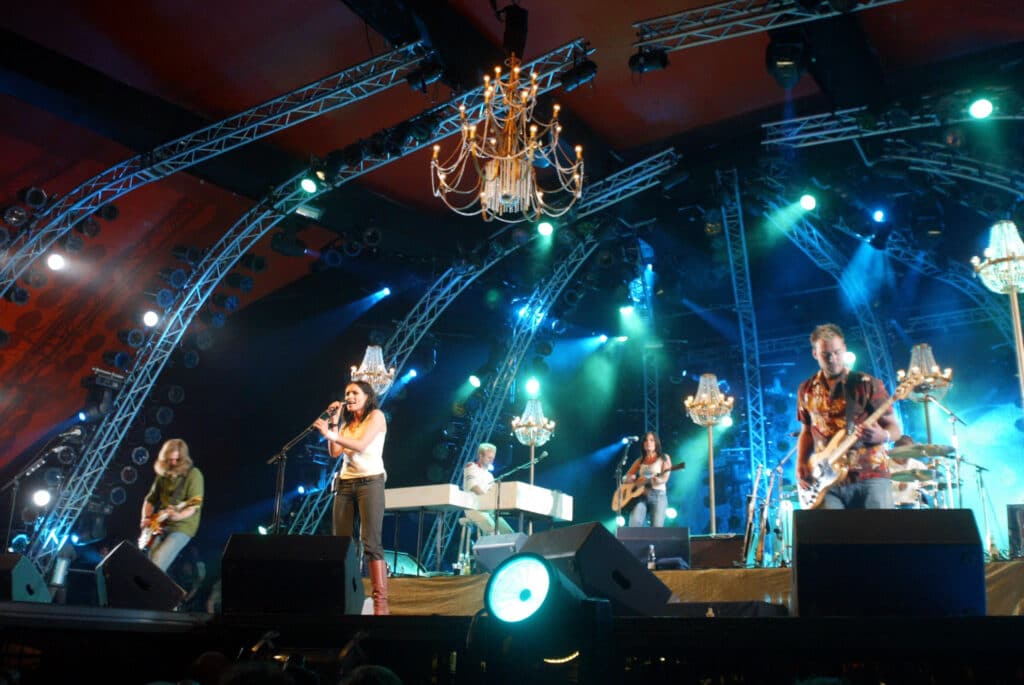
Photo by Bernd Muller/Redferns
NP: We headlined the Orange Stage at Roskilde Festival, and I think it would have to be that. It’s near where we live, it’s a lovely festival and it means a lot to this area. It was 10 or 11 o’clock at night, we had just put out a record and it got a beautiful reception and everything. So that was fantastic. It was just a lovely crowd on a lovely stage. It’s one that I’ve sort of repeated to myself, where I’ve thoroughly enjoyed it and felt like f*ck, I can’t believe I get to do this and get to be here.
JY: I think my favourite show with Nina was one we did in Spain, in the mountains near Madrid. We did a show in a sort of community theatre, and there was a couple of hundred people, which is all it held. Sometimes when you play provincial shows there can be a real gratitude from the audience – that you’ve come to their area and you’re not just playing in Madrid or London or Edinburgh or wherever.
But solo, my favourite show was easily at Celtic Connections in Glasgow, one of the biggest folk festivals in Europe. I’d played with Yorkston/Thorne/Khan and I came off stage thinking that was probably the highlight of my musical life. But then immediately afterwards I was off to Ireland to play some solo shows. I played in Waterford in this tiny room above a pub, which a lot of the gigs in Ireland are, so there was just north of a hundred people in the room but it was absolutely rammed. I’d been playing down there for years and years, so I don’t want to say I have a fanbase, but I’ve got people who come and see me, and we laugh and we joke and we talk about the last time and the time before and you know, I swear at them, and they swear at me and we just roll around laughing and it’s a very punk rock gig. But this one, everything went down especially well. Everything went right, the ghost stories went down well, the traditional songs went down well, it was just such a blast.
When we got off stage the guy kept the bar open for us. He said he never keeps the bar open but that was just the best gig. So that sticks out for me, I think that one kept me smiling for maybe six weeks afterwards. It was a huge, huge gig for me. A tiny wee gig. It was special.




